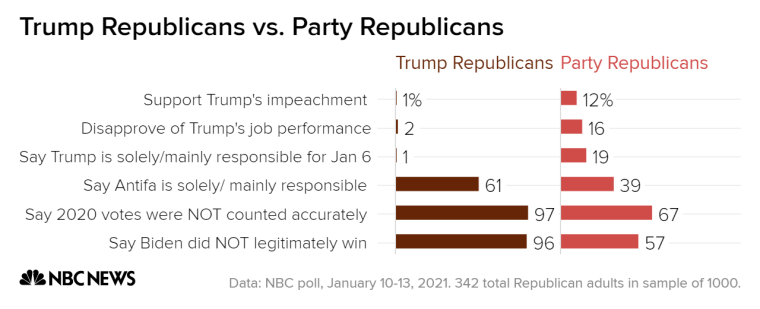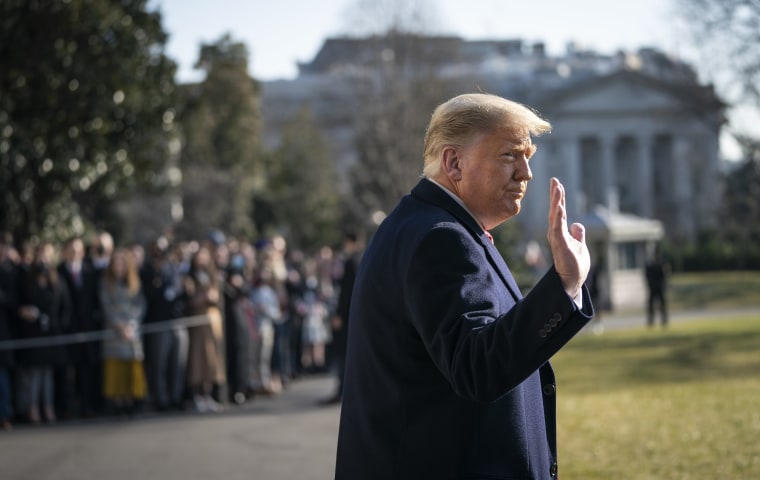WASHINGTON — As the Senate takes up Donald Trump’s impeachment trial — with little optimism among Democrats that the short list of Republicans open to breaking with the former president will grow — our NBC News poll from January showed that there is indeed an even split in the GOP between those more loyal to the party and those more loyal to Trump.
Among Republicans, exactly half (46 percent) said they consider themselves supporters of Trump more than the party, and exactly half (46 percent) said the opposite.
But that doesn’t mean that the party Republicans are raring to see Trump held accountable, either.

Among those who say they consider themselves foremost a supporter of the party rather than of the former president:
- Just 16 percent disapprove of Trump’s job performance
- Just 19 percent say Trump was solely or mainly responsible for the events of January 6
- Just 7 percent say they regretted their vote for Trump
- Just 12 percent support his impeachment and removal (the NBC poll was taken in his final days in office)
Sure, the Trump wing of the party is far less conflicted about any of this. In fact, more than 40 percent of Trump-supporting Republicans say the events of January 6 reinforced their vote for him. And just 1 percent said Trump bore any significant responsibility for the attack on the Capitol.
But even the half of the GOP electorate that appears open to skepticism of Trump doesn’t particularly blame him for the offenses outlined in the impeachment case — or think he must be held accountable.
Here’s how the impeachment trial will work
The impeachment trial of former President Donald J. Trump begins in the U.S. Senate at 1:00 p.m. ET, and the prosecution and defense will spend four hours debating the constitutionality of trying a former president, per NBC’s Capitol Hill team. The trial proceeds if a majority votes in favor of its constitutionality.
If the trial proceeds as is expected, the Senate will reconvene on Wednesday at noon ET and begin up to 16 hours of argument for each side. (Each side is limited to two days of arguments, and each can’t exceed eight hours per day.)
After both sides have presented their arguments, senators get a total of four hours to question both the prosecution and defense.
After the senators’ questions, there will be another four hours to consider subpoenaing witnesses and documents.
Then there will be four hours — in total — for closing arguments.
And finally, there will be the vote on whether to convict or acquit the former president.
Tweet of the day
Data Download: The numbers you need to know today
53 percent to 44 percent: The 2020 winning margin of late GOP Rep. Ron Wright in Texas’ 6th district. Wright, who was also a cancer patient, has died after contracting Covid-19.
51 percent to 48 percent: Trump’s margin of victory in the same district in 2020, after he won it by double digits four years earlier.
Four: The number of Republican senators who have announced they will not run for reelection in 2022 — after Alabama Sen. Richard Shelby did so yesterday.
$3,600: The amount of total proposed cash monthly payments for every child under age 6 under a new Democratic proposal.
27,213,569: The number of confirmed cases of coronavirus in the United States, per the most recent data from NBC News and health officials. (That’s 97,726 more than yesterday morning.)
467,019: The number of deaths in the United States from the virus so far, per the most recent data from NBC News. (That’s 1,443 more than yesterday morning.)
80,055: The number of people currently hospitalized with coronavirus in the United States.
325.3 million: The number of coronavirus tests that have been administered in the United States so far, according to researchers at The COVID Tracking Project.
79: The number of days left for Biden to reach his 100-day vaccination goal.
Talking policy with Benjy
The minimum wage meets the bean counters: As Democrats debate how to pursue a $15 minimum wage, the nonpartisan Congressional Budget Office released its eagerly-awaited analysis of the policy, and there’s something for everyone in the report.
The topline for critics is that the CBO predicts a $15 wage would lead to 1.4 million fewer jobs over 10 years and add $54 billion to the deficit. On the positive side for supporters, it would raise 0.9 million people out of poverty and raise wages for 17 million workers.
Backers of the $15 wage dispute the CBO’s overall take, pointing to outside research showing less dramatic effects on employment and more significant budget savings. But there’s also good news for them in the score. The $54 billion cost could give Senate Democrats a stronger basis to argue that it fits the rules of reconciliation, which requires provisions to have a significant budget impact, and thus could go in the upcoming COVID-19 relief bill.
How CBO says it impacts the federal budget is complicated. Some new spending would come from higher unemployment claims, some from higher wages for health care aides paid by Medicaid, and there are various shifts elsewhere. On the other side of the calculation, higher wages would bring in more tax revenue and reduce spending on certain anti-poverty programs.
The $54 billion may be a prerequisite to getting a $15 wage past the Senate parliamentarian, who is typically the final word and who President Biden has warned is unlikely to rule in Democrats’ favor. But the change in the budget is not necessarily enough on its own. Senate Democrats will also have to show the change is not “merely incidental” to the wage increase, which has knocked provisions with deficit effects out of previous reconciliation bills. And even if they succeed there, they might lack the votes to pass it, period
McDonough makes it through the Senate
President Biden got his seventh Cabinet confirmation on Monday night, when the Senate voted to confirm Denis McDonough to be Veterans Affairs secretary. Like most of Biden’s Cabinet confirmations so far, it was a largely bipartisan vote — an 87-7 tally.
So far, just one Cabinet confirmation vote has been along mostly partisan lines: DHS Secretary Alejandro Mayorkas, who was confirmed with 56 votes — receiving six votes from Republicans.
Six other Cabinet nominees are waiting to receive votes on the Senate floor and have already had committee hearings:
- Gina Raimondo (Commerce)
- Jennifer Granholm (Energy)
- Linda Thomas-Greenfield (UN Ambassador)
- Marcia Fudge (HUD)
- Thomas Vilsack (Agriculture)
- Miguel Cardona (Education)
Biden Cabinet Watch
State: Tony Blinken (confirmed)
Treasury: Janet Yellen (confirmed)
Defense: Ret. Gen. Lloyd Austin (confirmed)
Attorney General: Merrick Garland
Homeland Security: Alejandro Mayorkas (confirmed)
HHS: Xavier Becerra
Agriculture: Tom Vilsack
Transportation: Pete Buttigieg (confirmed)
Energy: Jennifer Granholm
Interior: Deb Haaland
Education: Miguel Cardona
Commerce: Gina Raimondo
Labor: Marty Walsh
HUD: Marcia Fudge
Veterans Affairs: Denis McDonough (confirmed)
UN Ambassador: Linda Thomas-Greenfield
Director of National Intelligence: Avril Haines (confirmed)
EPA: Michael Regan
SBA: Isabel Guzman
OMB Director: Neera Tanden
U.S. Trade Representative: Katherine Tai
And the number of the week is … 171
Find out why in this week’s podcast.
ICYMI: What else is happening in the world
The NY-22 race is finally, finally over.
Who might replace Richard Shelby in the Senate?
Pete Buttigieg is quarantining after possible Covid exposure.
Experts worry that states are lifting the very restrictions driving Covid-19 cases down.
Here’s what to expect in Neera Tanden’s confirmation hearing.
Paul Manafort won’t face charges again in New York, according to a new appeals court ruling.
Biden’s Justice Department will ask almost all Trump-era U.S. attorneys to step down.
The Georgia secretary of state’s office is opening an investigation into Trump’s January 2 call urging the overturning of the election results in the state.




